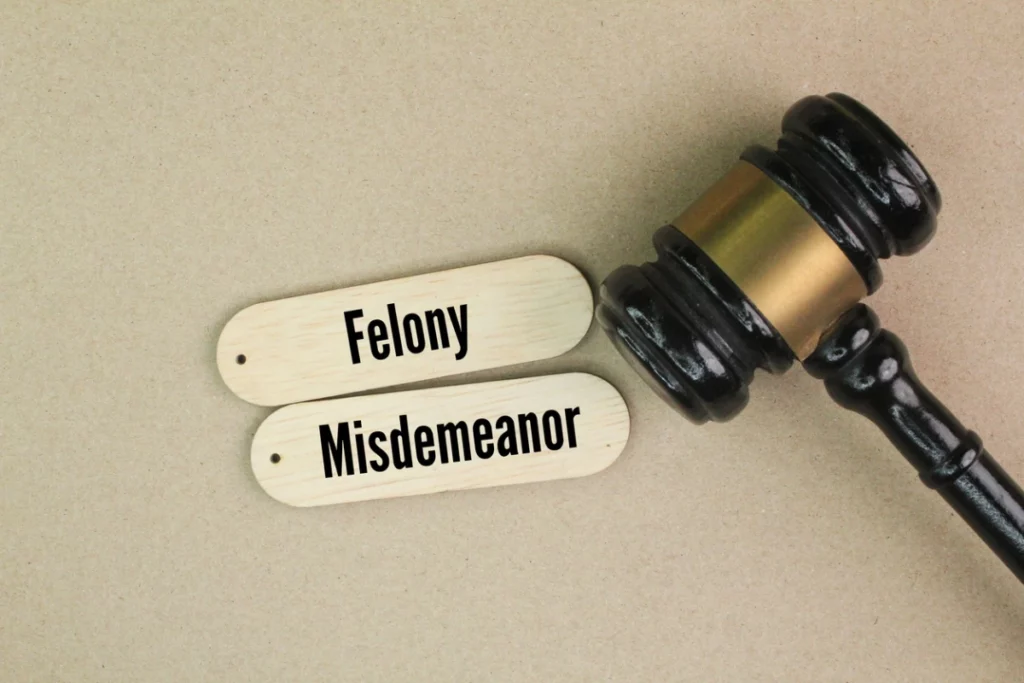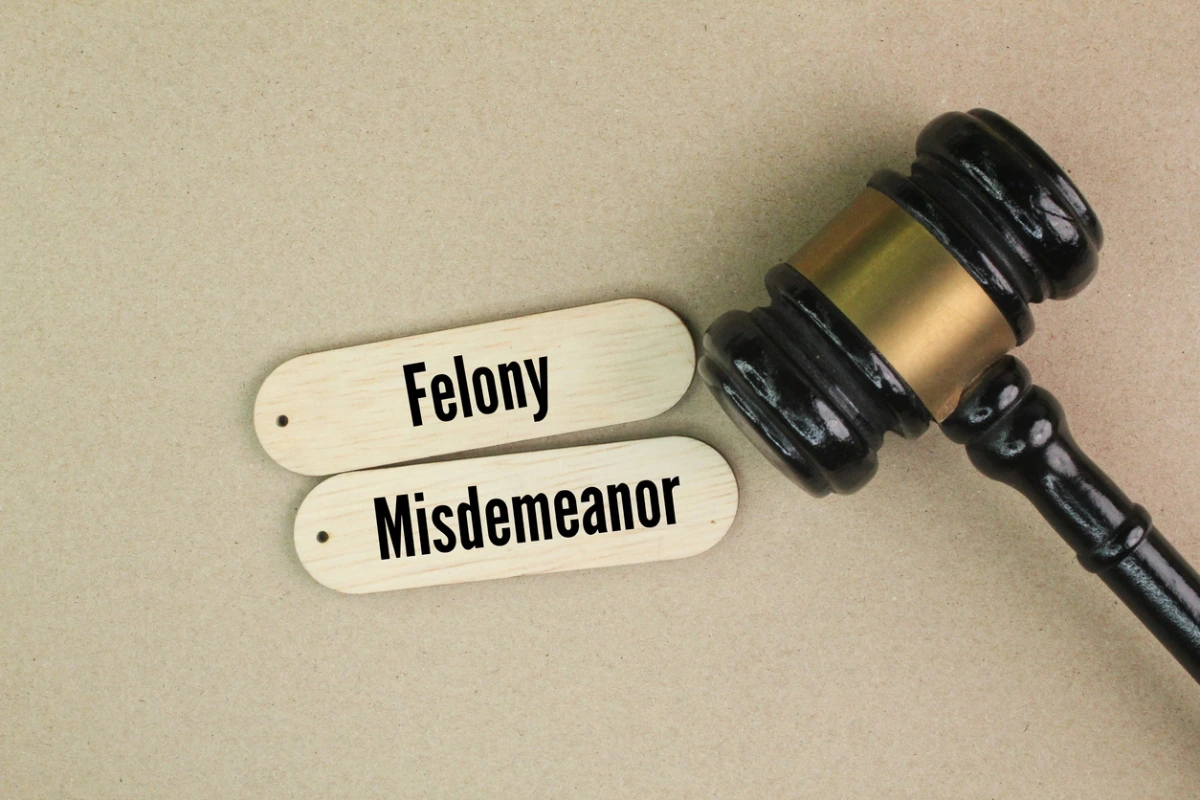
Understanding Misdemeanor Charges in Illinois
Illinois crimes are classified into misdemeanors and felonies, with misdemeanor offenses resulting in less than a year in jail with a conviction. Misdemeanor offenses are categorized into three levels: Class A, Class B, and Class C, with Class A being the most severe.
Misdemeanors are less serious crimes than felonies, but never take these charges lightly. A misdemeanor offense conviction can result in serious jail time, fines, probation, and a permanent criminal record that may follow you for the rest of your life.
Anyone charged with a misdemeanor crime in Illinois should understand the nature of the offense and its potential penalties immediately, so that they can make informed legal decisions. An experienced criminal defense attorney is critical for understanding the challenges you face and for minimizing the likelihood of conviction.
What Is a Class A Misdemeanor in Illinois?
Class A misdemeanors are the most serious misdemeanors in Illinois. A Class A misdemeanor carries a potential penalty of up to 364 days in jail and a fine of up to $2,500, in addition to court costs.
Examples include offenses like theft of property valued between $500 and $1,000, assault, domestic battery, certain drug offenses, and driving under the influence (DUI) for a first offense. A conviction may also result in probation, community service, or mandatory counseling, depending on the nature of your offense. Due to the significant jail time and fines associated with Class A misdemeanors, these offenses can have a substantial impact on your employment, housing, and professional licensing, particularly for repeat offenders.
If convicted, the judge may sentence you to jail time, probation, fines, and court supervision, depending on your criminal record and any mitigating or aggravating factors. Additionally, certain Class A misdemeanors, such as domestic battery, may carry enhanced penalties or mandatory consequences, including restrictions on firearm ownership.
Comparing Class A, B, and C Misdemeanors
A Class B misdemeanor is a criminal offense that falls between the state’s Class A and Class C misdemeanor classifications. A Class B misdemeanor typically involves offenses that cause minimal harm or pose a moderate risk to public safety, such as minor property crimes or specific violations of public order and peace.
Examples of Class B misdemeanors in Illinois include offenses such as criminal trespass to land (entering or remaining on someone else’s property without permission), disorderly conduct (engaging in behavior that disturbs the peace, such as making unreasonable noise), and certain types of theft involving property valued at $500 or less. The specific classification of the misdemeanor depends on the circumstances of the offense, such as the value of the property involved or whether the act was intentional.
Class B Misdemeanor Penalties
The penalties for a Class B misdemeanor in Illinois are outlined in the state’s sentencing guidelines. A conviction can result in up to 180 days in jail, a fine of up to $1,500, or both, though jail time is not always imposed. The courts may also impose probation, community service, or restitution (compensation to the victim) as an alternative to or in addition to jail time. The exact sentence depends on factors like your criminal history, the nature of the offense, and any mitigating or aggravating circumstances. For example, a first-time offender for a minor property crime may receive probation, while someone with prior convictions could face jail time.
Class B Misdemeanor Collateral Consequences
Beyond immediate penalties, a Class B misdemeanor conviction can have lasting consequences on your future. It becomes part of your criminal record, which may affect employment opportunities, housing applications, or professional licensing. A conviction will appear on most criminal background checks and may prevent you from being hired or retaining your position.
However, Illinois offers options such as expungement or record sealing in some cases, depending on the offense and your criminal history. Consulting with an experienced misdemeanor offense attorney is advised to address these processes and explore defenses, such as lack of intent or mistaken identity, which could lead to reduced charges or dismissal.
In summary, a Class B misdemeanor in Illinois is a moderate-level criminal offense, carrying a potential penalty of up to 180 days in jail, a $1,500 fine, or other penalties, such as probation. Common examples include criminal trespass or disorderly conduct, and the consequences extend beyond fines or jail to potential impacts on employment and other opportunities.
Because the outcome depends on case-specific factors, legal advice from a skilled defense lawyer is critical if you’re charged to ensure the best possible resolution. An experienced criminal lawyer may succeed in a case dismissal, a plea negotiation to a lesser charge, or expungement of the charge or conviction from your record.
Class C Misdemeanors
Class C misdemeanors in Illinois are less serious crimes, falling below Class A and Class B misdemeanors in terms of severity. It is typically associated with minor violations that do not cause significant harm or involve serious criminal intent. While less severe than felonies or higher-class misdemeanors, a Class C misdemeanor still carries legal consequences, including potential fines, jail time, and a criminal record, which can affect your employment, housing, or other opportunities.
Class C Misdemeanor Penalties
A Class C misdemeanor may be punished by up to 30 days in jail, a fine of up to $1,500, or both, as outlined in the Illinois Compiled Statutes. In many cases, jail time is not imposed, and penalties may include fines, community service, probation, or court supervision instead. The exact penalty depends on the nature of the offense, the defendant’s criminal history, and the circumstances of the case. For example, a judge may opt for a lighter penalty for a first-time offender compared to someone with prior convictions. Additionally, court costs and fees may be imposed, increasing your financial burden.
Examples of Class C Misdemeanor Offenses
Common examples of Class C misdemeanors in Illinois include minor offenses such as disorderly conduct, petty theft, trespassing, and certain traffic-related violations, including driving without a valid license. Other examples may consist of minor gambling offenses or public intoxication, depending on the specifics of the incident. These offenses are generally considered low-level, but they can still result in a criminal record.
Long-Term Consequences of a Misdemeanor Conviction
Do not make the common mistake of underestimating the impact of an Illinois misdemeanor crime conviction on your record. A misdemeanor conviction in Illinois, even for a minor offense such as a Class C misdemeanor, can have devastating repercussions that extend far beyond the initial penalties of fines or short jail time. While less severe than a felony, a misdemeanor conviction still creates a criminal record that can impact various aspects of your life, including employment, housing, education, and personal relationships. A skilled criminal defense attorney is essential to avoiding the consequences of a conviction, possibly including:
Job Challenges
One of the most significant long-term consequences of a misdemeanor conviction is its impact on your employment opportunities. Most employers in Illinois conduct background checks, and a misdemeanor conviction can appear on these reports, potentially leading to job denial or termination.
Specific industries, such as education, healthcare, or government, may have strict policies against hiring people with criminal records, even for minor offenses like disorderly conduct or petty theft. In these situations, just a charge or arrest can lead to job denial or termination. A conviction isn’t necessary for serious job problems to arise.
Additionally, a misdemeanor conviction may limit your eligibility for professional licenses, such as those required for nursing, real estate, professional trucking, or law, which can derail your career advancement. Even if the offense is unrelated to the job, the stigma of a criminal record can deter many employers from hiring you.
Housing and Financial Problems
A misdemeanor conviction can also complicate your living arrangements. Landlords and property management companies usually perform background checks, and, like employers, any black mark on your record can lead to a rejection of your application. This problem is typically acute in the most competitive housing markets.
Additionally, public housing programs may also impose restrictions on you with a misdemeanor conviction, limiting affordable housing options. Financially, a misdemeanor can lead to unexpected costs beyond fines, such as increased insurance premiums or the loss of income due to job loss. For example, a conviction for a traffic-related misdemeanor might trigger higher auto insurance rates, adding to your long-term financial difficulties.
Educational and Professional Challenges
If you’re a student or young adult, a misdemeanor conviction in Illinois can destroy your educational and career goals. Some colleges and universities in Illinois review criminal histories during the admissions process, and a conviction may affect your acceptance or eligibility for scholarships and financial aid.
Graduate programs, particularly in law or medicine, may also review your criminal record. Furthermore, a misdemeanor can impact your eligibility for internships or professional certifications, stalling your career development. These barriers can have a compounding effect, limiting your earning potential and long-term stability.
Personal Consequences
The social stigma of an Illinois misdemeanor conviction can strain your personal relationships and reputation. Friends, family, or colleagues may view you differently, which can lead to feelings of isolation or judgment. In some cases, a conviction may affect your custody disputes or parental rights; the court may consider a criminal record when determining your parental fitness.
Additionally, a misdemeanor conviction may impose restrictions on your civil rights, such as the right to possess a firearm, depending on the nature of the offense. These social and personal impacts can erode confidence and create lasting emotional challenges.
Expungement and Mitigation
Illinois law offers ways to mitigate the long-term consequences of your misdemeanor conviction through expungement or sealing of records. Expungement erases the conviction from public records, while sealing restricts access to the record, making it invisible to most employers and landlords.
Eligibility for expungement or sealing depends on the nature of your offense, the outcome of the case, and the applicable waiting period, which can range from one to five years for misdemeanors. Not all misdemeanors qualify, particularly those involving violence or sexual offenses. Consulting an experienced misdemeanor crimes attorney to explore these options or pursue alternatives, such as court supervision before a conviction is entered, can significantly reduce the impacts on your life.
Sentencing Alternatives for Misdemeanor Charges
With practical legal assistance in your case, you may be offered sentencing alternatives for misdemeanor offenses. Your criminal defense lawyer may negotiate with the prosecutor for any of the following sentencing alternatives:
Court Supervision
Court supervision is one of the most common sentencing alternatives for misdemeanor charges in Illinois. Under this arrangement, you are placed under court supervision for a specified period, typically ranging from six months to two years, without a formal conviction being entered.
You must comply with conditions such as paying fines, completing community service, attending counseling, or avoiding further legal trouble. If the conditions are successfully met, the case is dismissed, and no conviction appears on your criminal record. Court supervision is often available for offenses such as trespassing or minor traffic violations, making it an attractive option for a first-time offender to avoid a criminal record.
Probation
Probation is another sentencing alternative that allows individuals to remain in the community under supervision instead of serving jail time. For misdemeanors, probation typically lasts up to 24 months and may include requirements like regular check-ins with a probation officer, drug testing, or participation in rehabilitative programs.
Conditions are tailored to your offense; for example, if you are convicted of public intoxication, you might be required to attend substance abuse counseling. Successful completion of probation can result in the case being closed; however, a conviction may remain on your record unless your misdemeanor offense attorney pursues expungement or sealing of your record.
Community Service
The Illinois court may order community service as a sole penalty or as a condition of your supervision or probation. This alternative requires you to perform unpaid work for a nonprofit organization, government agency, or community program, typically ranging from 30 to 120 hours, depending on the severity of the offense.
Community service is often imposed for minor misdemeanors, such as disorderly conduct or vandalism, allowing defendants to contribute positively to society while avoiding jail time. Completing community service can demonstrate your accountability to the court and may lead to more lenient treatment in future legal issues.
Diversion Programs
Diversion programs are specialized alternatives designed to address underlying issues that contributed to your misdemeanor offense, such as substance abuse or mental health challenges. These programs, available in some Illinois counties, allow eligible defendants to complete treatment, counseling, or educational courses in exchange for having their charges dismissed.
For example, a drug-related misdemeanor might qualify you for a drug diversion program, requiring you to undergo treatment and pass regular drug tests. Successful completion avoids a conviction, making diversion a practical option for defendants seeking rehabilitation over punishment. Eligibility varies by county and the type of offense.
A significant benefit of a skilled criminal defense attorney for a misdemeanor charge is the possibility of alternative sentencing. Such an outcome is more likely with an experienced Illinois misdemeanor crimes lawyer negotiating with the prosecutor.
Why Legal Guidance Matters for Misdemeanor Cases
Facing a misdemeanor charge in Illinois can have devastating consequences that reverberate for years. An experienced criminal lawyer is a critical part of avoiding a criminal conviction that could upend your life. Mistakes during the legal process are much more likely if you attempt to navigate these waters alone.
A skilled Illinois criminal defense lawyer will review the evidence against you, assess your legal options, and help protect your legal rights. An experienced defense attorney is even more vital for someone charged with a Class A misdemeanor, given the higher stakes involved. Navigating possible plea deals, pre-trial motions, and sentencing alternatives requires an excellent understanding of the nuances of Illinois law.
Your criminal defense attorney will develop a tailored defense strategy to challenge your misdemeanor charge. This may involve questioning the evidence, such as witness statements or police reports, or arguing that your actions did not meet the legal criteria for the offense, such as reckless driving, retail theft, criminal trespass, or other petty crimes.
For instance, in a disorderly conduct case, an attorney might demonstrate that your behavior was not intentionally disruptive. Or, to avoid a DUI conviction, your lawyer may question how the police conducted your traffic stop.
Legal guidance ensures that defenses are presented effectively, whether through negotiations for a plea deal or at trial. Representing oneself without legal knowledge often leads to weaker arguments and missed opportunities to contest the charge.
If you have questions about Illinois misdemeanor crimes, you can speak with our experienced defense lawyers at Kostopoulos Criminal Defense Lawyers at any time by calling (630) 283-8024.





